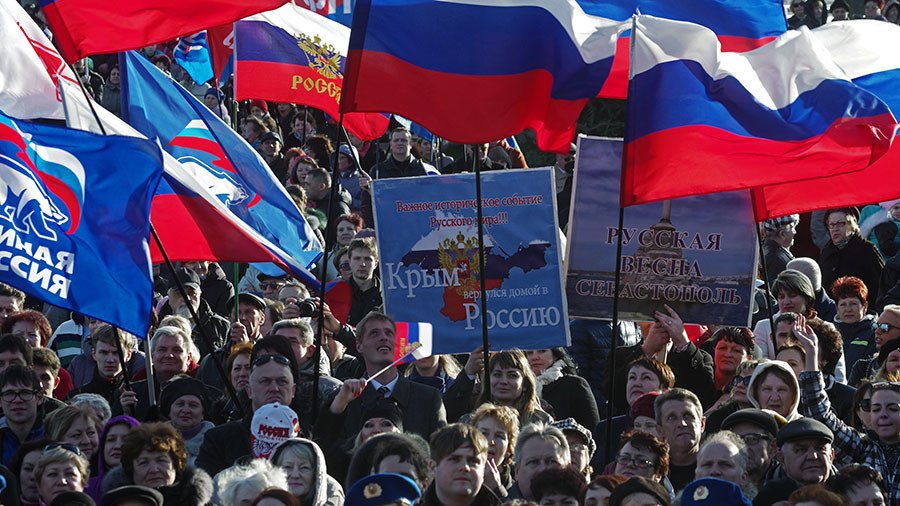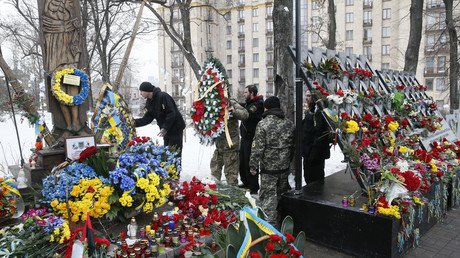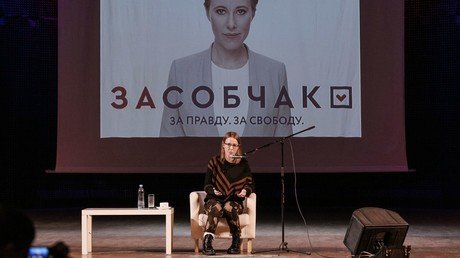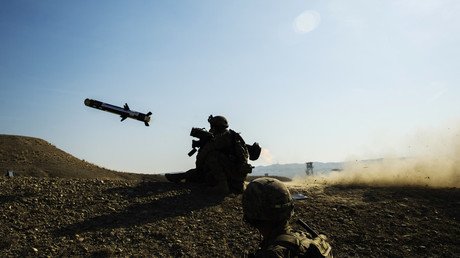Crimea is Russian, the matter is finished

A firestorm of anti-Russia hysteria in the UK is no excuse for peddling a revisionist narrative over the status of Crimea.
Yet just such a revisionist narrative is being peddled by the country’s foreign office to mark the fourth anniversary of Crimea’s decision, expressed in a democratic referendum on March 16, 2014, to reunite with Russia.
Worse, not only is London peddling a false narrative on the roots and causes of the Ukraine crisis – the wider political context in which the decision of the people of Crimea to reunite with Russia was taken – it asserts that economic sanctions against Moscow must remain until Crimea returns to Ukrainian sovereignty.
4 years ago Russia began its illegal annexation of #Crimea and has been forcing its influence on the population ever since. We must maintain Crimea-related sanctions until its return to Ukraine. #CrimeaIsUkrainepic.twitter.com/NyQSY4GC0M
— Foreign Office 🇬🇧 (@foreignoffice) March 11, 2018
This is a provocation that serves no cause or purpose other than to feed the beast of anti-Russia hysteria that is currently dominating Westminster on the back of the Sergei Skripal case.
READ MORE: ‘Russia as close to a rogue state as any’: Wildest MP claims from Skripal session in UK parliament
It should be borne in mind that Crimea’s status was changed not by Russia, but by the unconstitutional and illegal coup, actively supported by the British and other Western governments, which succeeded in toppling Ukraine’s elected and internationally recognized government in Kiev in February 2014.
Thus, on a de jure basis, the people of Crimea, the majority of whom are ethnic Russian and Russian speakers, were left with no government in Kiev that they were bound to recognize or that had any basis in international law. Moreover, the Maidan coup government not only assumed power in a clear and flagrant violation of the constitutional and democratic rights of those Ukrainian citizens who did not support it, it posed a direct threat to Ukraine’s Russian minority.
Those who opposed the coup were immediately threatened with repression. Naturally, the first in line here was Crimea, the Russian-speaking Crimea. In view of this, the residents of Crimea and Sevastopol turned to Russia for help in defending their rights and lives. - Russian President Vladimir Putin
Indeed, many of the Maidan coup government’s supporters, along with a number of its ministers and officials, were and are avowed neo-Nazis and anti-Russian racists for whom the country’s ethnic Russian population has always constituted an alien presence, making it ripe for cleansing in service to a monist Ukrainian national and cultural identity.
Such a monist identity, it should be pointed out, was and remains incompatible with Ukraine’s history and ethnic composition. Nonetheless, it is an identity that has historical roots, beginning with the establishment of the OUN (Organization of Ukrainian Nationalists) in Vienna in 1929.
Of Dmytry Dontsov, whose writings shaped the politics and ideology of the OUN from the organization’s inception, Professor Richard Sakwa writes: “He [Dontsov] proposed a new ‘nationalism of the deed’ and a united ‘national will’ in which violence plays an essential part in overthrowing the old order.”
This is fascism by any other name, which Sakwa confirms, intoning that within the OUN “fascist ideas about national rebirth took deep root.”
The most famous and revered Ukrainian nationalist of all, who likewise held a narrow monist Ukrainian national identity, is Stepan Bandera. Bandera’s image was prominent throughout the Maidan coup in 2014, this despite the fact he collaborated with the Nazi occupation of Ukraine, when it was part of the former Soviet Union, during World War II.
Contesting this narrow and rigid monist Ukrainian national identity is a pluralist alternative, which takes into account the country’s aforementioned actual ethnic composition. Returning to Professor Sakwa: “The pluralist model argues that all the peoples making up contemporary Ukraine have an equal stake in the development of the country.”
In other words, it marks the difference between intolerant monism and diverse pluralism.
This short detour into Ukraine’s history, and the ideological and national divide which largely defines it, is vital when it comes to providing the context for the current status of Crimea.
It is false to claim that Russia annexed Crimea. The Russian troops and military personnel that were present in Crimea during the Maidan coup in Kiev were there legally, under the terms of the 2010 Kharkiv Accords, agreed between Moscow and Kiev with respect to the status of Russia’s Black Sea Fleet.
The ensuing Crimean referendum in March 2014 restored the democratic rights of the region’s 2.2 million residents – rights that had been unceremoniously undermined and violated by the February coup. Thus it was a referendum conducted in extraordinary circumstances – circumstances created by an illegal coup with the open and active connivance of Western governments, including the British government, motivated by malign intent.
Bringing matters up to date, on March 12, 2018, the Council of the European Union announced a six-month extension of existing sanctions against Russia over Ukraine. In essence, these sanctions are reflective of the fact that the EU’s attempt to assert economic and political influence over Ukraine with its support for the coup failed, and failed miserably, plunging the country and its people into crisis.
Moscow was aware when it took the action it did in defending the rights and lives of ethnic Russians and Russian speakers in Crimea that it would incur the very sanctions that are currently in place. “I had to evaluate Crimea’s return and the possible ramifications to our relations with many countries around the globe,” President Putin revealed in a recent interview, before continuing that when “we consider the destinies of millions of people on the one hand, and the fact that Crimea is home to over two million people who want to return to Russia, with the difficulties in relations with other countries on the other, the former is far more important."
While London may have a geopolitical stake in Crimea, it certainly has no interest in the welfare of its people. If it did, it would not have helped inflame the riotous events of Maidan Square in Kiev at the beginning of 2014.
Four years on, Crimea is a part of the Russian Federation. Its people are safe and secure with their future assured.
This would not have been the case otherwise.
The statements, views and opinions expressed in this column are solely those of the author and do not necessarily represent those of RT.
















